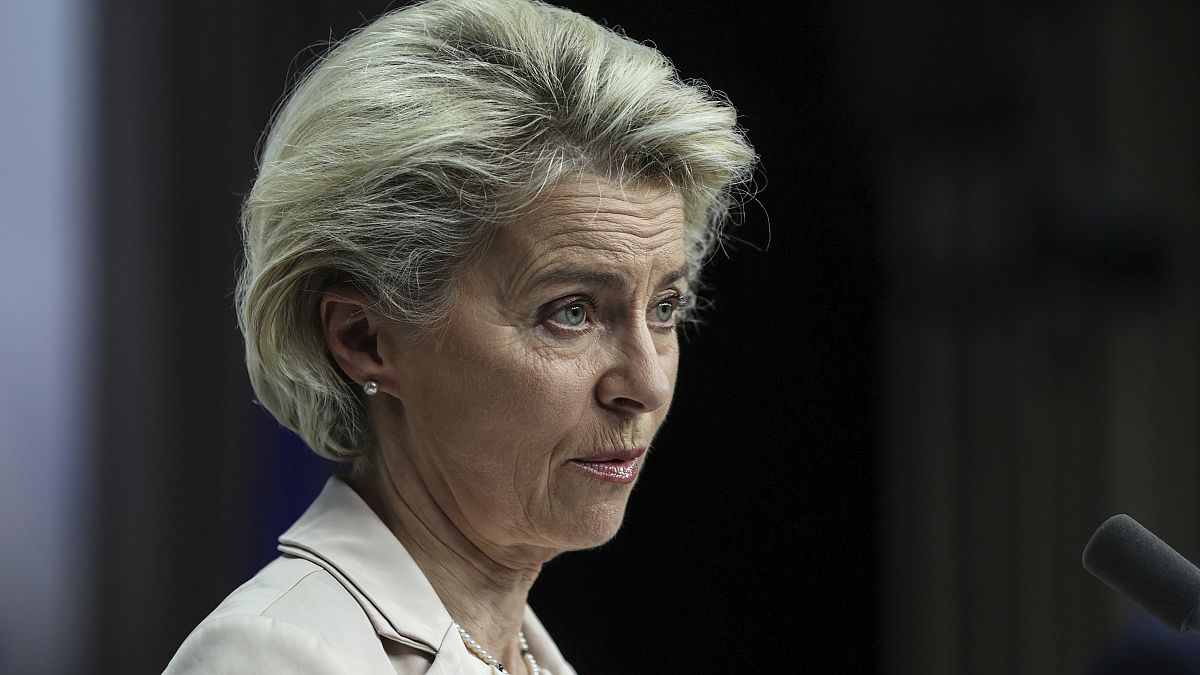Von der Leyen issued the warning during an interview with Euronews.
Russia will face "severe consequences" and "massive costs" if there is any military aggression against Ukraine, EU chief Ursula von der Leyen has warned in an interview with Euronews.
The US says Russia has amassed more than 100,000 troops near Ukraine's border and has warned it could invade.
Moscow has denied it wants a war. It says NATO expansion near its borders poses a national security threat and wants a pledge that Ukraine -- formerly part of the Soviet Union -- will never join the transatlantic military alliance.
"We should never give up to work on diplomacy," said von der Leyen. "But we are very clear that -- in case that there's any further military aggression of Russia against Ukraine -- this will have severe consequences and massive costs for Russia."
She said the EU had also prepared a "robust" and "very comprehensive" package of sanctions for Moscow if the worst-case scenario comes to pass.
"So far [the package] is concerning the economic and the financial sector," said von der Leyen, president of the European Commission.
"It would limit the access of Russia to the financial markets of the European Union, and it would limit Russia's access to crucial goods and technology it needs and that cannot be easily supplied and replaced.
"As we know, Russia has a very one-dimensional economy, mostly focussed on exporting fossil-based fuel. We know that it is crucial for Russia to have access to these goods and capital, and therefore it must be in the interest of Russia to de-escalate."
Von der Leyen's comments come after a high-level meeting this week between Russian President Vladimir Putin and Hungarian Prime Minister Viktor Orbán in Moscow. During a joint press conference, Orbán spoke of sanctions as an "unsuccessful tool" that is "doomed to failure".
"There is unity and a very strong alignment within the European Union. We are in constant contact," von der Leyen said when asked about Orbán's remarks.
"Where Hungary is concerned so far, they always supported the sanctions against Russia, and they have so far announced that, of course, they will keep the unity with the European Union if it is necessary to act."
Energy crisis concerns
Even if transatlantic partners are attempting to project a united front as deterrence, European governments are mindful their companies and citizens will be the ones bearing the brunt of new Russian sanctions due to the close links between the continent and its gas-rich neighbour.
Some fear the Kremlin might retaliate by cutting or blocking energy supplies, leading to shutdowns and blackouts across the bloc, where a persisting power crunch is already sending electricity bills soaring.
Von der Leyen said she was confident the EU will be able to resist such a radical move thanks to a marked increase in imports of liquified natural gas (LGN) from other international partners, which reached record highs in January.
"Indeed, this would be a severe situation, but we have done our homework and we are working intensively to prevent and be prepared for such a situation. When there was the [unlawful] annexation of Crimea in 2014, for example, there was just one LNG terminal in Europe. By now, we have built more than twenty. So we are able to receive LNG gas from other suppliers worldwide," she explained.
In recent days, EU officials have been in close contact with their counterparts from Qatar, Azerbaijan and Turkey to discuss gas purchases.
On Monday, the EU and the US will host an energy council in Washington.
"We have spoken to many different LNG suppliers worldwide who are very interested in [filling] the gap that Russia would leave and to supply LNG to the European Union," von der Leyen said, calling on EU countries to not lose sight of the ongoing green transition and boost investments in "home-grown" and "independent" renewable systems.
What does Russia say?
Moscow wants NATO to halt its eastward expansion, rule out Ukraine's membership and roll back its military forces, conditions he wants to see enshrined in a "legally binding" international treaty.
The US and NATO have already delivered their point-by-point response, which Putin dismissed, arguing the West continues to ignore Russia's security concerns. He also said the standoff could be resolved through diplomatic means if his demands are taken into account.
Last week, Vladimir Chizhov, the long-time Russian ambassador to the European Union, sought to assuage fears of an impending military incursion.
"Russia has no plans to invade either Ukraine or any other country," Chizhov told Euronews. "It's a bluff created not in Russia but in those countries that are now spreading this hysterical message across Europe and the world."
